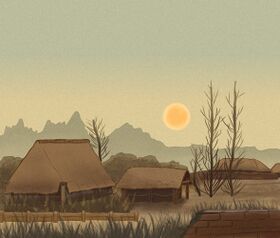Gordohse
Gordohse was a city in Asdoh, notable for being founded by the Gordoh family who attempted to turn it into a city state. They left it three generations later and founded the Empire of Barud.
| Gordohse | |
| Political details | |
|---|---|
| Country | Asdoh |
| Government | Murdoh of Gordohse |
| Historical details | |
| Established | 1800s FR |
| Disestablished | 1880s FR |
"Gordohse" means "that of Gordoh" or "Gordoh's".
History
A group of secessionists, led by a person named Mols Gordoh, established Gordohse in the beginning of the 19th CFR. Their goal was to grow it into a powerful city state and become independent. Most of them were from Estonoh, the capital of Asdoh. In order to evade the oversight of the army and tax collectors, they built the settlement far from roads and far from water sources. Instead, a complex system of water delivery was established, including a road built from Gordohse to Maird. This was accomplished by stealing stones from the road between Estonoh and Ernele, which led to wild speculation in Estonoh.
Gordohse was promoted as an independent city state, with its own royalty. Gordohs established their own traditional court, with all the proper ranks. At some point the royal oracle predicted that the new kingdom would prosper in the east. Davi Gordoh was the leader of the settlement at that time, and he led his people to the Quoon River, abandoning Gordohse.
The ruins of the settlement would later be used by Emperor Hun as a military camp during the first Asdoh campaign.
As the area become even more arid, turning into what today is known as the Moleeq desert, the ruins of Gordohse were used by travelers as a mid point when crossing the desert. By the middle of the second revolution travelers through Moleeq reported that they could no longer find the ruins, possibly due to them finally succumbing to the elements.
When Maksag Oordar set up the infamous Delavire-Gonne slave trade corridor, he ordered a settlement built at the location of Gordohse, to serve as mid point for the traders. The settlement was named Gonne, which is "half" in Bukk.
